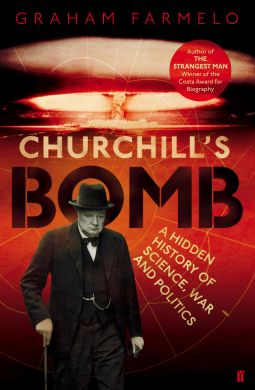
Churchill's Bomb
A Hidden History of Science, War and Politics
by Graham Farmelo
This title was previously available on NetGalley and is now archived.
Buy on Amazon
Buy on Waterstones
*This page contains affiliate links, so we may earn a small commission when you make a purchase through links on our site at no additional cost to you.
Send NetGalley books directly to your Kindle or Kindle app
1
To read on a Kindle or Kindle app, please add kindle@netgalley.com as an approved email address to receive files in your Amazon account. Click here for step-by-step instructions.
2
Also find your Kindle email address within your Amazon account, and enter it here.
Pub Date 3 Oct 2013 | Archive Date 2 Oct 2013
Faber and Faber Ltd | Faber & Faber
Description
Churchill's Bomb - from the author of the Costa award-winning biography The Strangest Man - reveals a new aspect of Winston Churchill's life, so far completely neglected by historians: his relations with his nuclear scientists, and his management of Britain's policy on atomic weapons.
Churchill was the only prominent politician to foresee the nuclear age and he played a leading role in the development of the Bomb during World War II. He became the first British Prime Minister with access to these weapons, and left office following desperate attempts during the Cold War to end the arms race.
Graham Farmelo traces the beginnings of Churchill's association with nuclear weapons to his unlikely friendship with H. G. Wells, who coined the term 'atomic bombs'. In the 1930s, when Ernest Rutherford and his brilliant followers, such as Chadwick and Cockcroft, gave Britain the lead in nuclear research, Churchill wrote several widely read newspaper articles on the huge implications of their work.
British physicists, in 1940, first showed that the Bomb was a practical possibility. But Churchill, closely advised by his favourite scientist, the controversial Frederick Lindemann, allowed leadership to pass to the US, where the Manhattan Project made the Bomb a terrible reality. British physicists played only a minor role in this vast enterprise, while Churchill ignored warnings from the scientist Niels Bohr that the Anglo-American policy would lead to a post-war arms race. After the war, the Americans reneged on personal agreements between Roosevelt and Churchill to share research. Clement Attlee, in a fateful decision, ordered the building of a British Bomb to maintain the country's place among the great powers. Churchill inherited it and ended his political career obsessed with the threat of thermonuclear war.
Churchill's Bomb is an original and controversial book, full of political and scientific personalities and intrigues, which reveals a little-known side of Britain's great war-leader.
A Note From the Publisher
This is the UK edition, and unfortunately we can't supply review copies to readers from the US.
This is the UK edition, and unfortunately we can't supply review copies to readers from the US.
Available Editions
| EDITION | Other Format |
| ISBN | 9780571249787 |
| PRICE | £25.00 (GBP) |



